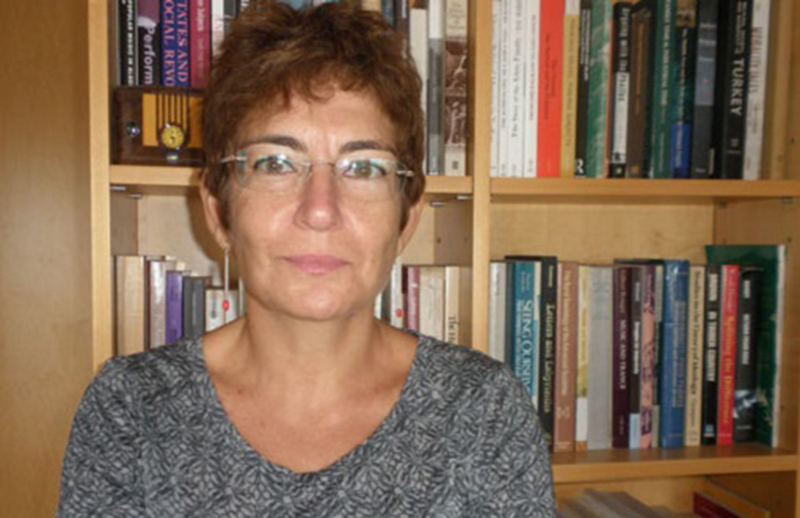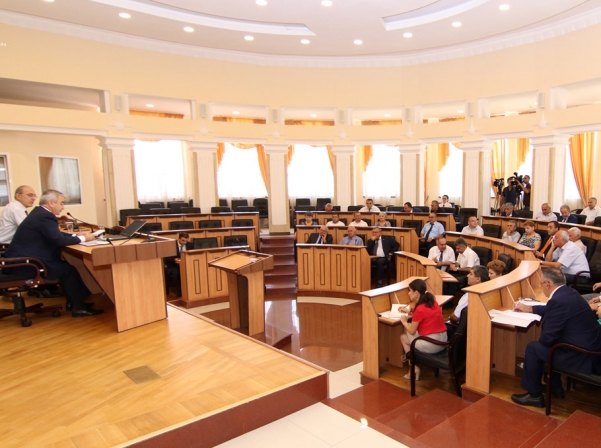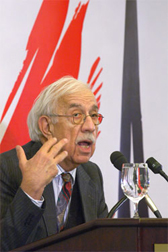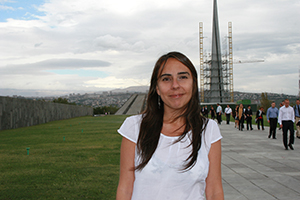By Hambersom Aghbashian
Professor Leyla Neyzi (born July 29, 1961) is a Turkish academician (Anthropologist, Sociologist, and Historian), who is currently a professor at Sabancı University, Faculty of Arts and Social Sciences, Istanbul, Turkey. After graduating from Robert College of Istanbul, she studied anthropology at Stanford University (B.A.1982), and earned her (M.A.) in Cultural Anthropology from City University of New York in 1986, and her Ph.D. in Development Sociology from Cornell University in 1991. She worked as assistant professor at Bosphorus University (1992-1994) and as the Oral History Project Director, at Economic and Social History Foundation (1995-1996). She currently teaches Anthropology at Sabanchi University, Faculty of Arts and Social Sciences. Her interests are Oral history, memory studies, European and Middle Eastern ethnography, nationalism and minorities, youth and social movements. She has a long list of published articles and many books including “Speaking to One Another: Personal Memories of the Past in Armenia and Turkey – Bonn: dvv international, 2010”. Leyla Neyzi received many awards including “Malcolm Kerr Dissertation Award, Middle East Studies Association of North America, 1992.” “Research Award, Sabanchi University, 2003-2004.” and others.
In December 2008, two hundred prominent Turkish intellectuals released an apology for the “great catastrophe of 1915″. This was a clear reference to the Armenian Genocide. The brief text of the apology stated ” My conscience does not accept the insensitivity showed to and the denial of the Great Catastrophe that the Ottoman Armenians were subjected to in 1915. I reject this injustice and for my share, I empathize with the feelings and pain of my Armenian brothers and sisters. I apologize to them.” Leyla Neyzi was one of the prominent Turkish intellectuals who signed the apology. (1)
Under the title “Turkish, Armenian scholars examine common grief in memories”, “armenianow.com” wrote on March 22, 2010: “Scholars from Turkey and Armenia have launched a joint project to record the countries’ perceptions of each other and examine how the events of 1915 are remembered in the collective mind of each society. While a Turkish scholar (Leyla Neyzi) said the grief that Armenians suffered throughout the deportation period during the last days of Ottoman Empire was still a topic of discussion in Anatolia, an Armenian counterpart said her colleagues do not have slightest doubt that what occurred in 1915 was ‘genocide.’ “”There is still a nostalgic and warm point of view [in Anatolia] toward the lives of the Turkish and Armenian peoples before 1915,” Professor Leyla Neyzi told the Hürriyet Daily News & Economic Review earlier this week. “Stories of being neighbors are still alive and the local memory is extremely strong.” (2)
In his article “Turkey Has Acknowledged the Armenian Genocide”, Ugur Ungor wrote on April 27, 2012 in “The Armenian Weekly”: “‘Turkey denies the Armenian Genocide’ goes a jingle. Yes, the Turkish state’s official policy towards the Armenian Genocide was and is indeed characterized by the “three M’s”: misrepresentation, mystification, and manipulation. But after nearly a century, a different picture emerges. Even though most direct eyewitnesses to the crime have passed away, oral history interviews yield important insights. Elderly Turks and Kurds in eastern Turkey often hold vivid memories from family members or fellow villagers who witnessed or participated in the genocide.” Ugur Ungor had interviewed 200 Turks and Kurd, (grand-)children of contemporaries in eastern Turkey, over many years (2002, 2004, 2007) and documented his work. Ugur Ungor also mentioned “Besides the excellent research conducted in Turkey by colleagues such as Leyla Neyzi, Ayşe Gül Altınay, and others, interviews by individual researchers are at best a drop in the ocean. A measured research project with a solid book as output would be a memorable achievement for the centenary of the genocide. (3)
Professor Leyla Neyzi, participated in a workshop held in Sabancı University, (May 31-June 2, 2013) entitled “Hrant Dink Memorial Workshop – Coming to Terms with War, Genocide, and Political Violence”, where she introduced her paper ‘Youth and History in Turkey: To Remember or To Forget?’ The workshop was organized by Sabancı University in collaboration with Hrant Dink Foundation and Anadolu Kültür. (4)
According to Today’s Zaman newspaper, September 26, 2014, A group of academics, journalists, artists and intellectuals have released a statement condemning in the harshest terms what they define as expressions that include “open hatred and hostility” towards Armenians in Turkish schoolbooks, which were exposed by the newspapers Agos and Taraf. The statement said: “The revolutions history and history textbooks should be collected immediately, with an apology issued to everyone and particularly to Armenian students. This is where the path to Turkish-Armenian peace lies, at this time when we are approaching 2015.” Professor Leyla Neyzi was one of the intellectuals who signed the statement. (5)
London School of Economics and Political Science (LSE) Contemporary Turkish Studies organized a three-day public conference entitled “Encountering the Past in Turkey” (11-13 May 2015). A new interest in history emerged in Turkey that had erased its Ottoman past. The most traumatic aspects of Turkish history, especially those that were considered taboo, or simply denied until recently, became issues of public debate. The Armenian Genocide, the Dersim and Marash massacres, the Wealth Tax, and expulsions of Greeks. At the face of an official policy of denial, increasing number of activists, artists, scholars, and citizens demand a deeper understanding and recognition of past atrocities in order to atone and seek justice. The conference explored how, why, under what conditions, and among which groups did willingness to confront the Armenian Genocide and other violent episodes, how to come to terms with the past as well as avoiding it? What are the implications of encountering the past for contemporary dynamics in Turkey? By doing so, it is hoped that the conference will contribute to promoting acts of reconciliation that have begun in Turkey. Professor Leyla Neyzi was among the distinguished speakers who participated to this conference, where she introduced her research “Encountering the Past in Turkey: A Personal Reflection on Two Decades of Research and Experience.” (6)
On November 20 and 21, 2015, the Hrant Dink Foundation in Istanbul held the latest in a series of groundbreaking historical conferences. The 2015 edition was entitled ‘A Civilization Destroyed: The Wealth of Non-Muslims in the Late Ottoman Period and the Early Republican Era’. The conference organized in cooperation with Bogazici University, Istanbul Bilgi University and Sabanci University was held with broad participation at Bogazici University, Albert Long Hall. The conference, which received much attention, was broadcaste live on www.hrantdink.org website both in English and in Turkish. The history of expropriation and destruction of the wealth of non-Muslims through policies of annihilation of minorities and Turkification in the Late Ottoman and Early Republican Period was explored with an interdisciplinary perspective. Leyla Neyzi chaired the fifth panel titled ‘Personal and Family Accounts’. (7)
* The London School of Economics and Political Science, founded in 1895 (commonly known as the London School of Economics or LSE ) is a public research university located in London, England and a constituent college of the federal University of London.
1- http://www.armeniapedia.org/wiki/200_prominent_Turks_apologize_for_great_catastrophe_of_1915
2- https://www.armenianow.com/genocide/21782/turkish_armenias_scholars_project_genocide
3- http://armenianweekly.com/2012/04/27/ungor-turkey-has-acknowledged-the-armenian-genocide/
4- http://hrantdink.org/?Detail=702&HrantDink=14&Lang=ar
5- http://www.todayszaman.com/national_group-of-intellectuals-condemn-anti-armenian-statements-in-textbooks_359935.html
4- www.lse.ac.uk/Encountering-the past ..
7- http://europeofdiasporas.eu/ideas/conference-civilization-destroyed










